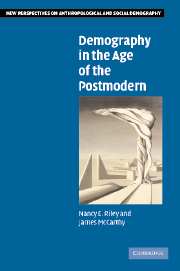Book contents
- Frontmatter
- Contents
- Acknowledgments
- 1 Introduction: why examine demography?
- 2 A brief introduction to postmodernism
- 3 The essentials of demography
- 4 A genealogy of demography
- 5 Demography's place in the social sciences
- 6 Feminist demography
- 7 Postmodern perspectives in demography
- 8 Some final thoughts
- Notes
- References
- Index
4 - A genealogy of demography
Published online by Cambridge University Press: 05 June 2012
- Frontmatter
- Contents
- Acknowledgments
- 1 Introduction: why examine demography?
- 2 A brief introduction to postmodernism
- 3 The essentials of demography
- 4 A genealogy of demography
- 5 Demography's place in the social sciences
- 6 Feminist demography
- 7 Postmodern perspectives in demography
- 8 Some final thoughts
- Notes
- References
- Index
Summary
Disciplines are complicated sites. They are often rife with conflict as well as cooperation, marked by competing paradigms of concern and competing hierarchies of power.
(Clarke 1998: 7)The state of demography today – what it is currently and what it is not – is connected to its particular history. Here, considering the genealogy of demography will be useful to an understanding of the distance and direction it has come, and its potential future directions. A genealogical approach – based on that conceptualized by Nietzsche and Foucault – is a critique that focuses not on finding a single thread of historical evolution leading to the present state, but, rather, resists the notion of a single origin, arguing that the current situation is the result of multiple – often fragmented and contradictory – influences and their struggle with one another. A genealogy traces multiple and conflicting images, categories, words, and practices, and how they come to have meaning and power and how they then, in turn, come to produce other practices and other meanings.
For demography, then, a genealogical approach allows us to acknowledge that the current state of the field is not the result of a single influence, the effects of a particular viewpoint or perspective. It has, instead, resulted from a variety of influences, which have interacted in significant ways with one another and with the larger field as well.
- Type
- Chapter
- Information
- Demography in the Age of the Postmodern , pp. 61 - 80Publisher: Cambridge University PressPrint publication year: 2003



